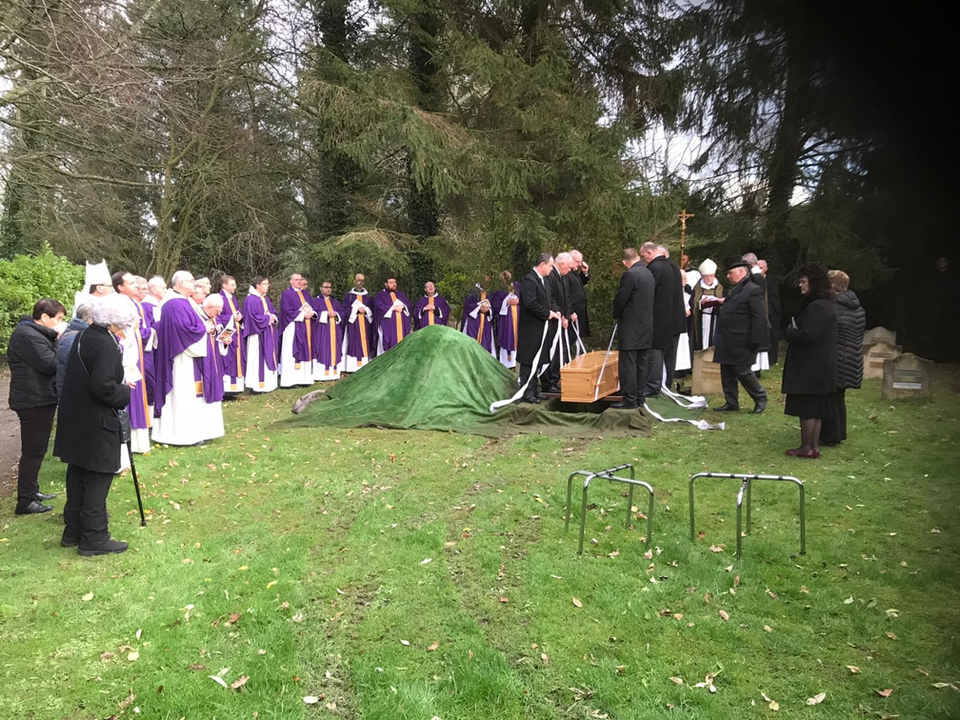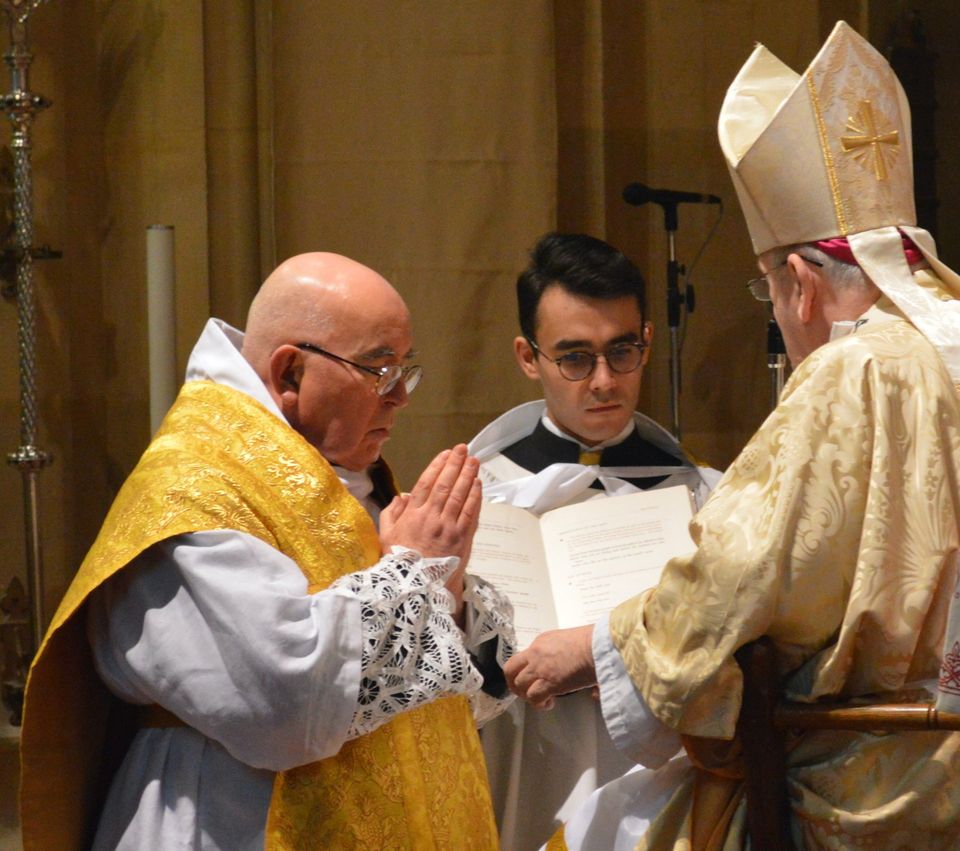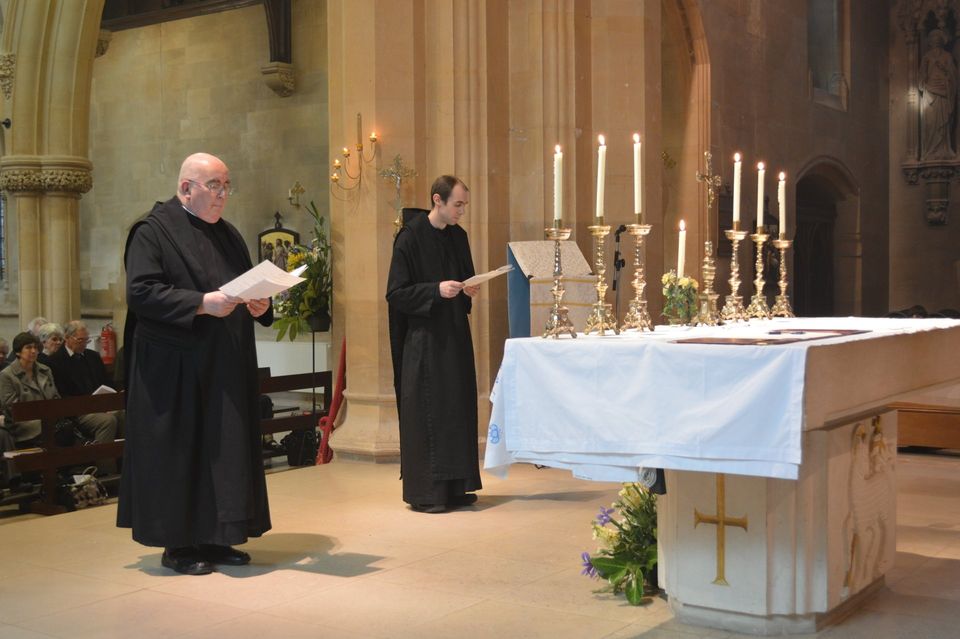Dom Alistair Findlay RIP
Abbot Paul's Homily from the funeral is below:
“Do not let your hearts be troubled. Trust in God still and trust in me. I am going to prepare a place for you; I shall return to take you with me, so that where I am you may be too.”
On 15th January, Fr Alistair made his way to his room after Morning Office, taking the lift, as he always did, to the second floor, then walked along the corridor. As he placed the key in the lock, he suffered a massive heart attack and died. To all of us it came as a terrible shock. We knew that last Summer he had undergone surgery at Worcester Hospital and returned to Hereford Hospital from time to time for a check up and that he took time off to rest when needed. But he continued to work hard, especially at his pastoral duties, and never intimated that he was as unwell as he knew himself to be. Almost as an act of faith, he continued to eat rather unwisely and made no attempt to live a healthier lifestyle. He took literally those words of Jesus we have just heard, “Do not let your hearts be troubled. Trust in God still and trust in me.” He knew that he could die at any moment and that the Lord would return to take him that he might be with Jesus in the Father’s house. He was not afraid to die, for he believed the Lord’s word. Every step was an act of faith. His sudden death was truly symbolic of the Christian life: we have been given the key to the door that leads to eternal life; we can put the key in the lock, but only God can open the door and let us in.
Alistair Findlay was born on 19th August 1955 in North Shields, Tynemouth, the only child of William and Joyce (née Archer). He was very proud of being a Geordie and retained a great affection for the place of his birth, as well as for the Northumbrian saints, especially St Cuthbert. He was baptised at Dunston Hill Methodist church, but confirmed as a teenager in the Church of England. He studied at the Priory Primary School, Tynemouth, and then at Tynemouth Grammar Technical School, where he took his A levels in 1976. This was followed by 3 years at the College of the Venerable Bede, Durham University, where he trained as a teacher, receiving a Certificate in Education. After teaching practice at Gaywood Park, King’s Lynn, he lived with the Taizé Community in France for two years. This was his first experience of monastic life and one that he would cherish for the rest of his life. Here he was also able to perfect his knowledge of the French language. On his return to England, he taught at Coventry Blue Coat School from 1979 to 1988, when he took up a post at St John’s Preparatory School, Enfield, North London. This was followed by two years at Haileybury Junior School, Windsor. Finally, in 1993, he took up his last teaching post as Assistant Headteacher at Topcliffe School, Birmingham, where he would remain until 2010. He was, of course, an excellent teacher, a true professional, who is remembered for the clarity of his expositions in the classroom and the charitable and fatherly way he treated his pupils. You might be surprised to learn that among the many roles he took on, he also coached rugby.
Ever since his time at Taizé, where, in addition to running youth meetings, he was also in charge of catering – he was a first class chef, but never got the chance to share this talent at Belmont – ever since Taizé, he had been contemplating the possibility of some sort of Christian community life. At the same time, his faith deepened and matured as he devoured books on every aspect of Philosophy and Theology. He became very learned in the things of God, that spiritual journey to which the Lord invites each one of us. This prayerful reading gradually led him to think seriously about becoming a Catholic. After the necessary preparation, he was received into Full Communion on 24th March 1994, the Thursday before Palm Sunday, at the church of Our Lady of Perpetual Succour, Rednal. Following his conversion, he visited a number of monasteries, including Belmont and Mount Saint Bernard. Some of you will know that he was a frequent participant in our retreat programme. In 2010 he took early retirement and so was free to consider the possibility of a monastic vocation. Eventually, he entered Belmont in July 2012 as a postulant and was clothed in the habit on 1st February 2013 together with Br Dunstan.
Although, on entering the monastery, he said, “I wish I had done this sooner,” nevertheless it wasn’t an easy transition from the freedom of the lay state to the restrictions of the monastic novitiate, from bachelorhood to the coenobitic life. He would soon discover that self-discipline and a stiff upper lip were not sufficient to put up with and accept the foibles and idiosyncrasies of the brethren. It’s one thing to be a guest, looking in from the outside, but quite another to be one of brothers living cheek by jowl with the others. The monastic virtues do not come easily; you have to struggle with humility, obedience, silence and charity. Although he cooperated fully with the Holy Spirit on the search for God and the quest for holiness, at times his powerful nature would get the better of him and he would express his anger openly. He once described himself as “intolerant and impatient.” One of his favourite expressions was, “I am incandescent with rage,” and although he meant it, it was said with a twinkle in his eye, as though mocking his inability to control his powerful emotions. He applied himself assiduously to his novitiate studies and to the work assigned to him. He made his First Profession on 2nd February 2014 and his Solemn Profession on 4th September 2017.
In the meantime, he had begun theological studies at Sant’Anselmo in Rome, which he took to with enthusiasm. He enjoyed being a mature student. In preparation, he took an Italian course at Padua, staying with the community at Santa Giustina, the monastery of Augustine Baker’s profession. The three years he spent in Rome were some of the happiest in his life. He contributed much to community life at Sant’Anselmo and loved being at the vibrant heart of the Catholic Church. He worked as a translator at the 2016 Abbots’ Congress and began doing translation work for A.I.M. (Alliance for International Monasticism). He completed the three-year Baccalaureate in Theology, while at the same time working on a License in Liturgical Theology, to which he was putting the finishing touches here at Belmont when he died. He was a deeply committed student, writing copious notes, reading every book he could get his hands on and producing essays so good they could have been published. Alistair took to heart those words from the Prophet Daniel we heard today, “The learned will shine as brightly as the vault of heaven, and those who have instructed many in virtue, as bright as stars for all eternity.” He was to continue this hard work in his preparation of homilies, retreat talks and conferences. You will remember that even his short weekday homilies were the fruit of prayer and study, jewels of perfection in content and style, theologically sound and yet always practical, homely and helpful.
On returning from Rome, Fr Alistair was ordained to the diaconate by Archbishop George, present with us this afternoon, on 4th September 2018 and then to the sacred priesthood on 12th January 2019. It was only the Sunday before he died that he celebrated the first anniversary of his ordination. From the moment he returned to Belmont, he threw himself with vigour into whatever work he was asked to do. A difficult job, which was not to his liking, was that of Procurator. He was also a director of Monksoft, which deals mostly with Hedley Lodge. He was elected to the Abbot’s Council as a community councillor and became a trustee. But he was happiest of all doing pastoral work, celebrating the sacraments, preaching, visiting the sick and assisting the dying and bereaved. He took special care over the celebration of funerals. He began serving as Officiating Catholic Chaplain with the Armed Forces. Then there were talks, conferences and retreats. He tackled all these with that professional spirit he had learned during his 35 year teaching career. You could not but admire his dedication and the genuine love and concern he had for all those with whom he came into contact as a priest.
And yet, he was a priest for just a year. A parishioner said to me that she found it a great source of consolation that Fr Alistair had been able to celebrate a whole liturgical year as a priest, that he had celebrated all the major feasts and seasons. In fact, he began and ended his earthly ministry with the Baptism of Jesus. St Paul reminded us today that, “When we were baptised in Christ Jesus, we were baptised in his death; in other words, when we were baptised we went into the tomb with him and joined him in death, so that as Christ was raised from the dead by the Father’s glory, we too might live a new life.” At 7.20 on the morning of 15th January, no longer symbolically but in very deed, Fr Alistair entered into the tomb with Christ, so that in Christ he could be raised from the dead by the Father’s glory. Jesus, who is the Way, the Truth and the Life, has prepared a place for him in his Father’s house. We pray that there he may rest in peace. Amen.













